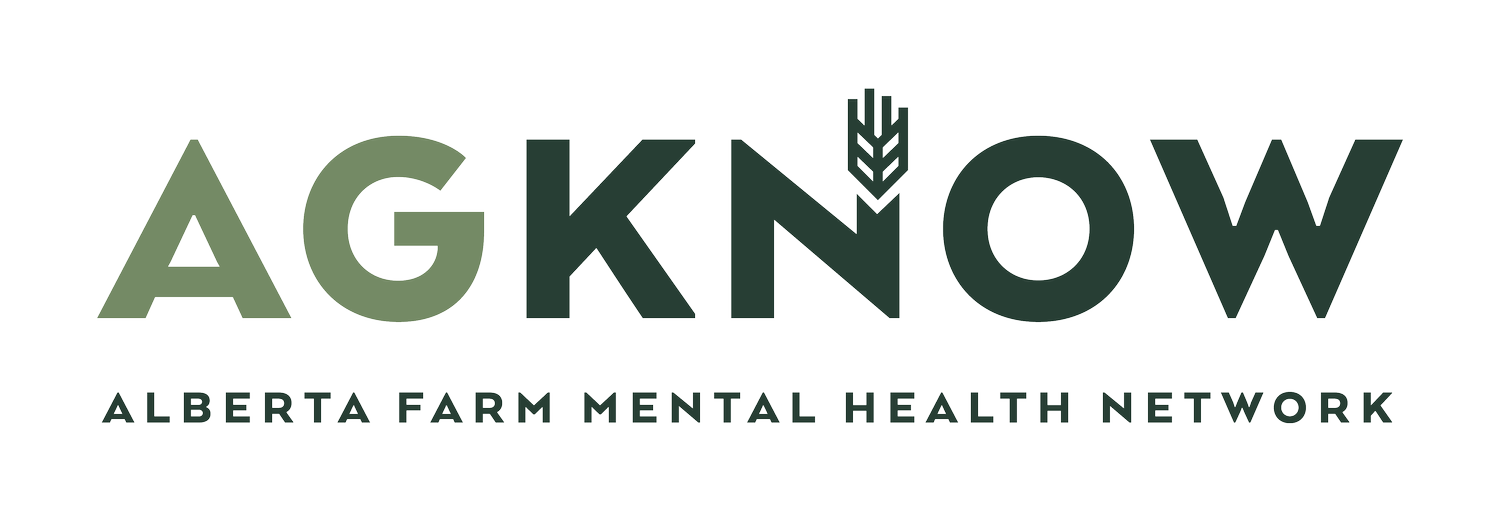THERAPIST NETWORK MEMBER INTERVIEW: Patti Lott
Patti Lott
1. why did you want to join the Therapist network at AgKnow?
I’m not a city girl – my life has almost always been rural, something I’m deeply grateful for. Land stewardship and food production are such fundamental contributions; being a part of AgKnow gives me the opportunity to encourage and support the wellbeing of the people whose livelihoods the rest of the world depends on. I’ve personally experienced some of the challenges the farming life presents and I have a great deal of empathy for those experiencing them now. My counselling skills, along with my ranching experience, give me what I believe is an informed and genuine ability to serve the AgKnow community.
2. What is your connection to farming?
I’ve lived in rural southern Alberta most of my life. 18 years of those were as owner/operator of a mid-sized ranch, raising grass-fed cattle. Currently, my husband and I lease our grazing pastures to a neighbor.
3. Why does having good mental health on the farm matter?
It matters in the same way that having good physical health on the farm matters – and the two are intertwined. The unique demands of farming require fortitude and resilience, and these are part of good mental health. Individuals and their families are more productive and happier when they are in good health.
4. FROM YOUR EXPERIENCE, WHAT ARE SOME OF THE MAJOR ISSUES FACING FARMERS TODAY?
Rural life can sometimes lead to isolation and loneliness, and if we’re struggling with depression or anxiety or grief, or our relationships are faltering, isolation only makes that worse. The work of farming never really ends – you’re with it constantly, and that can lead to exhaustion. There are many factors that farmers and ranchers have little or no control over (weather, market fluctuations, cash flow, financial certainty, etc.); it can be easy to feel overwhelmed, frustrated, defeated. Climate change impacts farmers and ranchers in a direct way – anxiety or depression are understandable, as is grief. And then if you layer any of these challenges on top of existing personal trauma, the struggle can be quite difficult.
5. HOW CAN GOING TO THERAPY HELP A FARMER WHO IS STRUGGLING WITH THEIR MENTAL HEALTH?
There is a perception that farmers tend to be strong, independent types – and many of them are – but they’re also a diverse group of people with diverse experiences and needs. Even the strong and independent experience tough times, but expectations can make it difficult to admit it. Therapy offers a safe space, with someone who understands and is skilled in helping. Just talking about what’s bothering us can be surprisingly helpful, and therapy is a place to acquire fresh understandings about our circumstances and ourselves. Also, families are systems – when one person makes a change, it affects all the others, as well.
6. How can you help a farmer with their mental health? why should they choose you, what can you offer them?
This is what I’m trained to do and it’s what I love doing. Clients tell me they appreciate my warmth and authenticity (often, my new clients are by referral). I personalize sessions to meet people’s needs in ways that support them best. And I am acquainted with ranching, and have a basic understanding of farming in general.
7. what is your preferred style of therapy? Do you have any specializations?
Just as different crops and different livestock require different care, each person benefits from a mental health care approach tailored to their unique challenges and needs. We’ll work together to find solutions that suit you. I use a person-centered approach, and find that cognitive and solution-focused therapies are often useful. I offer EFT (Emotional Freedom Techniques) as a powerful and gentle alternative to regular talk therapy. In these and other ways, I can help clients deal with depression, anxiety, anger, relationship issues, trauma and PTSD, unhelpful thoughts and perceptions, etc. I also offer a holistic, positive approach to assessing and treating ADHD.
8. WHAT CAN A FARMER EXPECT IN THEIR SESSION WITH YOU?
They can expect acceptance, non-judgment, and a safe, confidential place to talk about what’s going on. There’s never any pressure. We’ll get to know each other a bit and I’ll offer another perspective and ideas for change. Most of all, they’re likely to leave a first session with a sense of hope that things can, indeed, be better.
9. WHAT WORDS WOULD YOU USE TO DESCRIBE YOU?
People tell me I have a calm and relaxing manner. I’m accepting and nonjudgmental. I see the good in people and I help them to see it in themselves. I have a sense of humor – and sometimes that’s just what’s needed in a session.
10. And finally, what’s the one piece of advice that you would recommend to someone who’s struggling with their mental health?
You’re not broken. Mental health struggles are more common than you might imagine. And there are ways to feel better. Connect with others and share with someone you trust. And - just like you’d seek medical help for a physical injury, seek it for an emotional or psychological one. You wouldn’t go to a car salesman for advice on planting crops. Speaking to a therapist is a positive addition to finding support in friends and family.
Interview style:
Written responses.
Patti Lott is a Counsellor and Therapist based in Rocky View County, AB. She is available for virtual video sessions and via phone.


